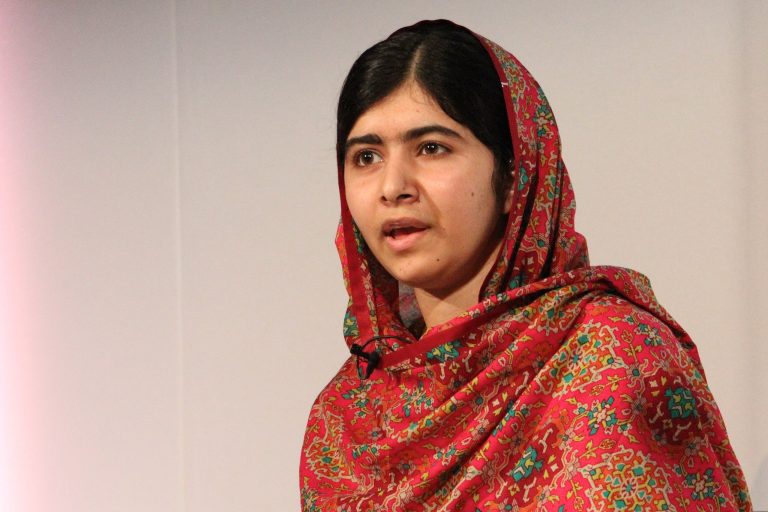
Photo: Nobel Peace Prize winner Malala Yousafzai at Girl Summit, 2014. Credit: U.K. Department for International Development
“We cannot end war with war.” – Malala Yousafzai
New York, N.Y. We have all been profoundly inspired by the work and impact of Malala Yousafzai. A true thought leader and global citizen, Malala embodies the values of courage, resilience, and unwavering commitment to justice. We wholeheartedly support her tireless efforts to champion girls’ education and advocate for human rights worldwide.
Malala Yousafzai was born on July 12, 1997, in Mingora, Pakistan. From an early age, she was acutely aware of the challenges faced by girls in her community when it came to accessing education. Inspired by her father, Ziauddin Yousafzai, an educator and activist himself, Malala developed a passion for learning and an unshakeable belief in the transformative power of education.
In 2009, at just 11 years old, Malala began writing a blog for the BBC under a pseudonym, detailing her life under Taliban rule and their attempts to ban girls from attending school. Her courage and eloquence in describing the situation drew international attention, but also made her a target. Despite the threats, Malala continued to speak out for the right to education.
On October 9, 2012, Malala’s advocacy nearly cost her her life. She was shot in the head by a Taliban gunman while riding a bus home from school. The attack was intended to silence her, but it had the opposite effect. Malala’s survival and recovery galvanized global support for her cause and brought unprecedented attention to the plight of girls denied education.
After recovering from her injuries, Malala did not retreat into silence.
Instead, she emerged stronger and more determined than ever. She and her family relocated to the United Kingdom, where she continued her education and advocacy work. In 2013, Malala co-authored the memoir “I Am Malala,” which detailed her life and activism and became an international bestseller.

I heard Malala speak on September 26, 2013 when she was honored at the Clinton Global Citizen Awards. She was only 16 and had just been shot the year before. In her speech, she spoke about the need for education for girls and asked the governments of the world to work for peace.
“I hope that governments and all responsible people will realize that we cannot end war with a war,” she said. “We can fight war. We can fight war through dialogue, peace, and education.”
In this speech she noted that “in America, people are waiting for a woman president.” Hillary Clinton, who went on to run for president in 2016, smiled broadly.
In 2014, at the age of 17, Malala became the youngest-ever recipient of the Nobel Peace Prize.
This honor recognized her unwavering fight for the right of every child to receive an education. In her acceptance speech, Malala emphasized the importance of education in fostering peace and progress, stating, “One child, one teacher, one book, and one pen can change the world.”
Malala’s advocacy extends far beyond her personal story. In 2013, she co-founded the Malala Fund with her father, aiming to ensure that girls around the world have access to 12 years of free, safe, quality education. The Malala Fund invests in education advocates and activists who are challenging the barriers that prevent girls from going to school in their communities. Through this work, Malala has had a profound impact on education policy and funding worldwide.
One of Malala’s most remarkable qualities is her ability to connect with and inspire young people.
She has used her platform to amplify the voices of young activists and to promote youth leadership in the fight for education and equality. Her speeches at the United Nations and other global forums have rallied millions to the cause of universal education.
In addition to her work with the Malala Fund, Malala’s story has been shared through various media, including the documentary “He Named Me Malala,” which further spread her message of hope and resilience. Her influence is not confined to speeches and books; Malala has met with world leaders, policymakers, and grassroots activists to advocate for policy changes and increased investment in education.
Malala’s academic achievements are also noteworthy.
She graduated from the University of Oxford in 2020 with a degree in Philosophy, Politics, and Economics. Her educational journey, from a small town in Pakistan to one of the world’s most prestigious universities, is a testament to her belief in the power of education to transform lives.
Supporting Malala Yousafzai means endorsing a vision of a world where every girl can learn and lead without fear of violence or discrimination. Her leadership, courage, and relentless advocacy inspire hope and action in the fight for a more just and equitable world. Malala’s work reminds us that education is not just a fundamental human right but a key to unlocking potential and fostering global peace and prosperity.
As a thought leader, Malala exemplifies the power of one voice to create change. Her journey from a young girl in Pakistan to a global advocate for education serves as a beacon of hope for millions. She embodies the kind of leadership that prioritizes empathy, equity, and action, and it is why we are honored to support her.
Brave Voice that Defied Taliban: Malala’s Unwavering Fight for Girls’ Education (June 14, 2021)
#MalalaYousafzai #GirlsEducation #GlobalCitizen #EducationForAll #NobelPeacePrize #YouthActivism #HumanRights #Equality #MalalaFund #CourageInAction #WomenEmpowerment #PakistanHero
TAGS: Education, Human Rights, Nobel Prize, Taliban, Pakistan, Activism, Women’s Rights